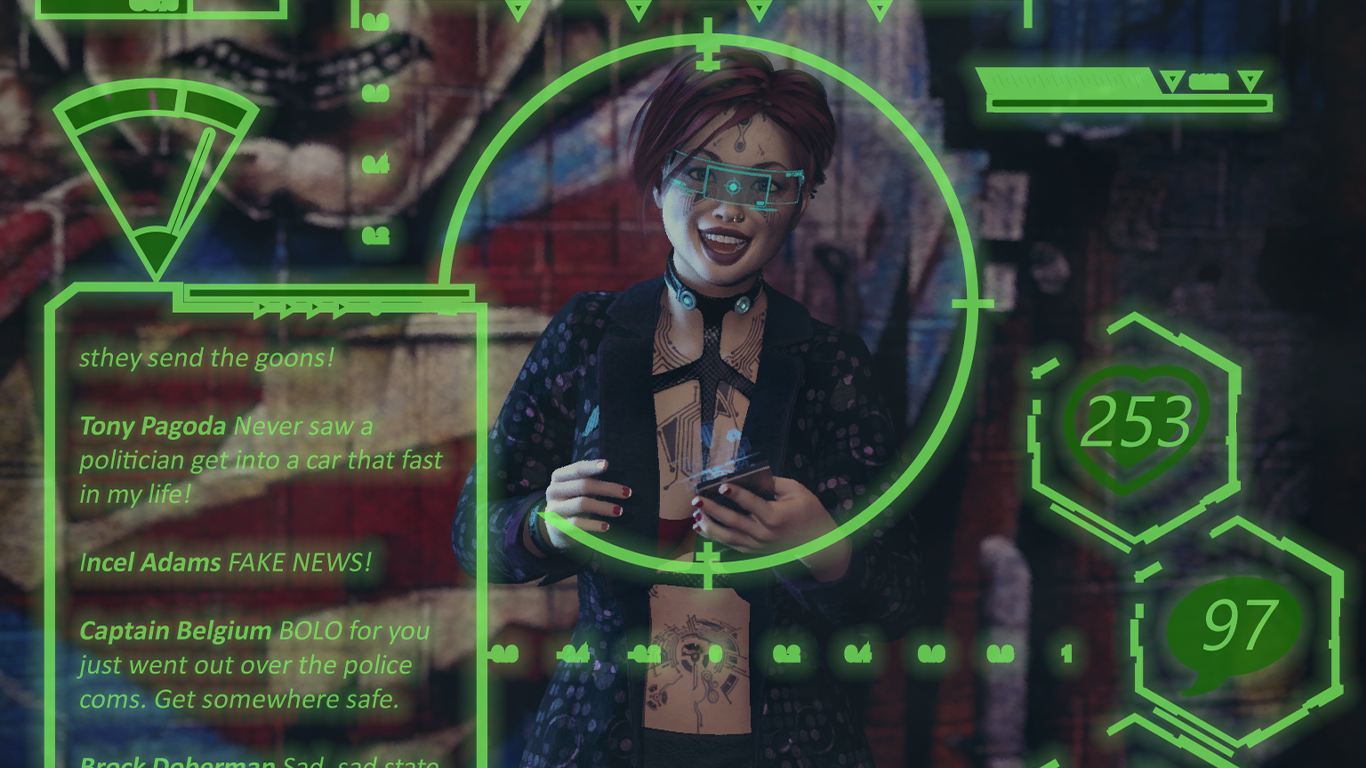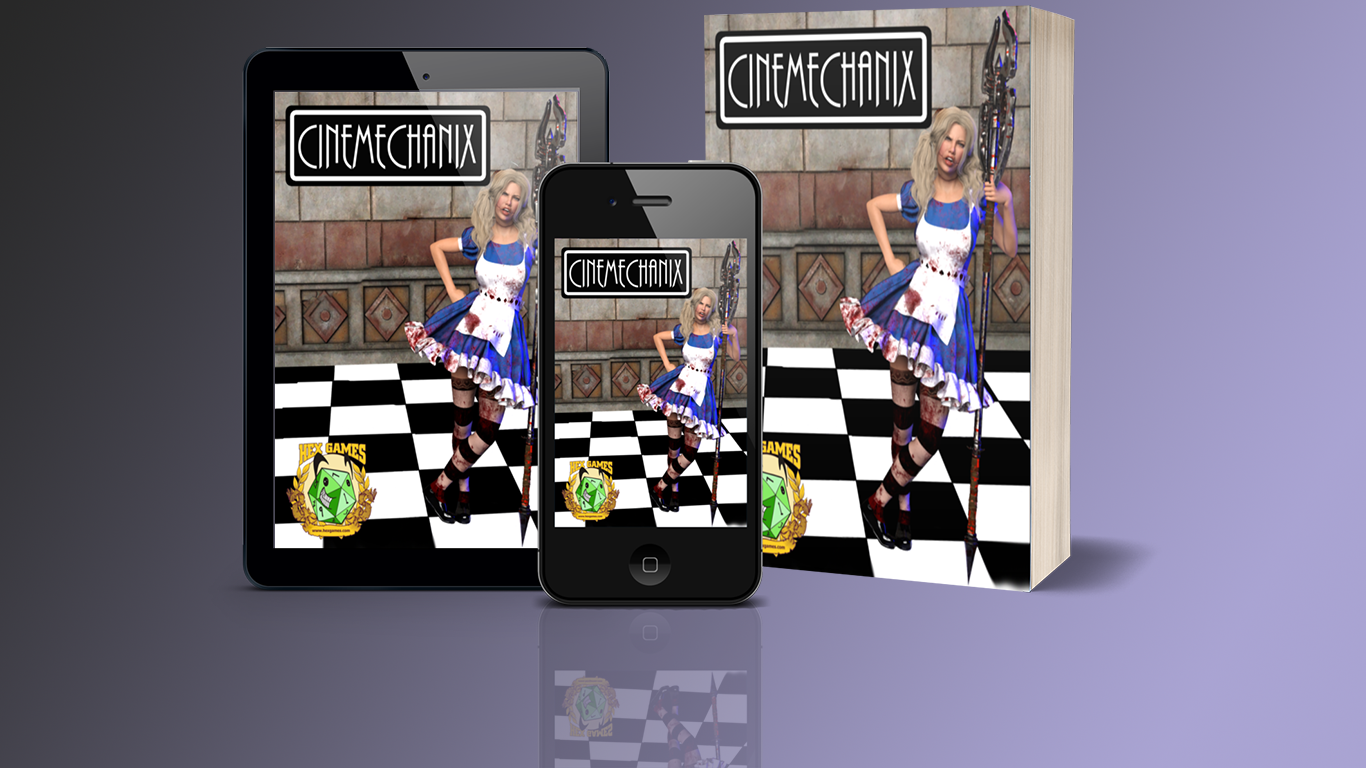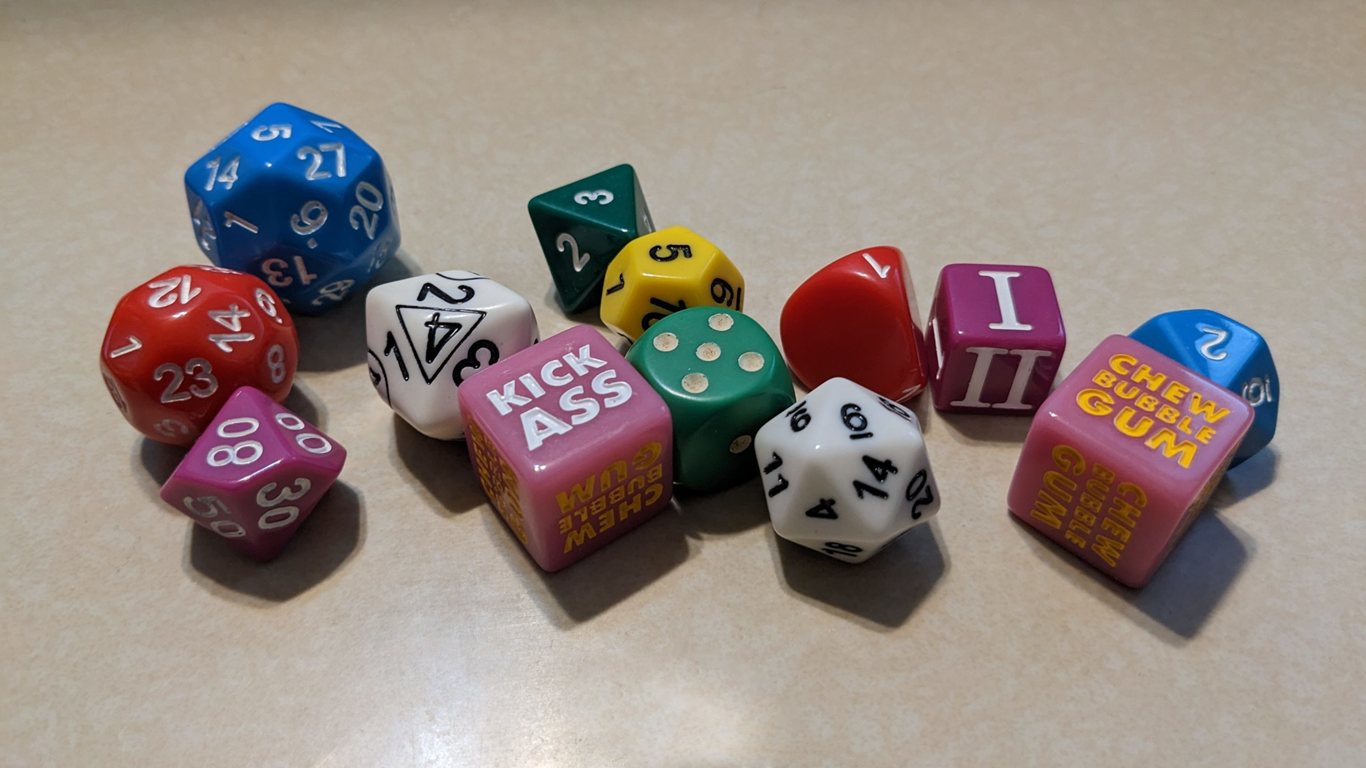We may earn money or products from the companies mentioned in this post.
Before I get into the blog, the whore-like nature of my existence obligates me to mention that my newest ebook, 20 Movies You Probably Haven’t Seen Reviewed By Some Guy You Don’t Know is now available for just 99 cents at the Kindle store. My reviews of Dark Dungeons and the D&D movie may be of particular interest to a few of you.
Moving on to gaming, even though we haven’t officially started playtesting yet, one brave GM (James Pearson) managed to convince his players to act as guinea pigs in a Flash Gordon-inspired game. They didn’t run into any major problems and came up with some good questions and observations about the game. You can find out more by joining the playtest group on Facebook.
As I’m sure I’ve mentioned here before, one of the ideas behind Cinemechanix is that it’s “adaptable” rather than “generic.” What I mean by that is that rather than giving you, for example, a set of supposedly universal rules for magic that you’re supposed to make work for everything from the Hyborean Age to Hellblazer, we want to give you a set of tools you can use to define magic for the game you want to run. Last week I wrote the section that goes into more detail about how to do that, and since it’s more about game design choices than Cinemechanix-specific rules, it seemed like the kind of thing that even readers who aren’t interested in the new system may find useful, so I’m going to pass off an excerpt as this week’s blog.
Abilities that are too broad or vaguely-defined can be problematic. The most common problem is that it’s hard to present meaningful challenges to a character with an ability that’s so ambiguous that he can use it to overcome almost any obstacle, and a story with no meaningful challenges isn’t very compelling. Additionally, a character who’s too versatile can overshadow the other members of the group, which can result in friction between players. Even when an ability’s versatility isn’t problematic, special rules can be useful in modeling genre conventions in greater detail and giving players a better idea of what’s possible. For example, a game based on martial arts movies might benefit from special rules that define specific fighting styles or specialized combat maneuvers.
Since most people have a reasonable idea of what sorts of things real-world abilities allow people to do, the abilities that tend to need special rules are those that pertain to the supernatural and fantastic: magic, super-powers, alien abilities, and other weirdness. If these abilities work in a way that’s strongly influenced by a particular story or style of storytelling, the source material sometimes provides limits for the ability either in the form of specific “rules” or a more general sense of tone and flavor. If that’s the case, you probably don’t need any special game mechanics unless they’re necessary to model the source material. For settings without a distinct example to follow, it helps to come up with some rules and guidelines so everyone knows what to expect. When it comes to implementing special rules for character abilities, there are several common models you can use (in whatever combination works best for your game).
Specialization
Specialization is just narrowing down the broad ability into something more distinct so it can’t be used as a Swiss army knife to solve all the character’s problems. Since all games already require the players to put some thought into how broadly or narrowly traits should be defined, this option is the most straightforward. Just like one character may need a Trademark in “Biology” instead of “Science,” another might need his Role to be “Demonologist” instead of just “Wizard.”
Enumerated Abilities
This method works a lot like specialization, but instead of narrowing a broad skill down to a specific theme or area of expertise, the GM and player agree to a specific set of (often completely unrelated) abilities that come with the trait. This method is useful for traits with a very specific set of benefits and drawbacks, like racial abilities for non-human characters. For example, fairies might get a Concept Bonus for stealth and charm rolls, have the ability to use glamor, and suffer a Penalty Die to all rolls when touching iron or within earshot of a ringing church bell. Some enumerated abilities (a vampire’s vulnerability to sunlight, for example) may have additional rules or Special Effects associated with them.
Arbitrary Limits
As the name implies, arbitrary limits are conditions or limitations placed on an ability purely in the interest of preventing overuse or modeling the source material. Most arbitrary limits are tied to a specific time frame (the character can only use the ability once per scene), but other kinds of limits are possible (the ability only works at night). It’s not unusual to place arbitrary limits on specific enumerated abilities. For example, werewolves always get a Concept Bonus for perception rolls due to their keen senses and always take extra damage from silver, but can only assume wolf form if the moon is at least half full. Even though there’s a clear meta-story reason for limiting character abilities (if a character can use Awesome Power six times in a row in a scene, the scene will be dull and Awesome Power will seem a lot less awesome when it’s done), arbitrary limits usually work best when there’s some in-story logic to explain why the character can’t use the ability as often as he likes.
Ability Slots
Skill slots are similar to enumerated abilities, but instead of a fixed set of abilities, the character gets to choose specific abilities from a larger list. Depending on the nature of the main ability, the character may be limited to using the selected abilities (wizards can only cast spells they know) or may get a bonus for selected abilities and/or a penalty for abilities that the character hasn’t specifically mastered (a wrestler can attempt any wrestling technique, but gets bonus for his “go-to” moves, like a figure four leg lock or piledriver). If access to abilities are restricted in some way, you can impose pre-requisite abilities (a psychic character has to learn ESP before he can learn mind control), story requirements (a battle mage can’t learn the War Song of Thul until he’s killed a man with his bare hands), or a minimum Hero Factor and/or Trademark dice requirement (a character needs a Hero Factor of 4 and 3 dice in Kung Fu to learn the Five Point Palm Exploding Heart Technique).
Variable Ability Slots
These work like regular ability slots, but only some of the abilities the character has access to are available to use at a particular time. For example, a cyberpunk character might have to decide which skill chips he’s got installed or a wizard might have to memorize his spells. Some slotted abilities (like the skill chips) can be used as often as the character wants when they’re active. Others have arbitrary limits on usage. For example, wizards in a setting with Vancian magic forget spells immediately after casting them.
Limited Power Reserves
If you use this method, the ability draws on some source of power and each use drains the power source, kind of like a battery. Abilities can be powered by Acclaim, Stamina (probably with special rules for recovering Stamina loss incurred by using the ability), or a custom stat that represents the character’s power reserves. Abilities can also be powered by external resources, like Unobtainium batteries or ritual components that are consumed by when used. For “batteries” that don’t draw on the character’s personal energy, you have to be careful to make the resources required rare enough that players will want to conserve them, but make finding and tracking them simple enough that resource management doesn’t get in the way of the story. When designing this sort of system, you need guidelines for determining how much using the ability costs. Unless you’re using an existing trait, you’ll also need rules for determining limits for how much power a character or power source can hold and how (or if) the energy gets restored after it’s used.
Story Consequences
With this method, there’s no game mechanic or (meta-) physical law preventing the character from using the ability however he wants, but there are superstitions, taboos, and other codes of conduct or societal consequences that discourage using the ability in certain ways or situations. For the limitation to be meaningful, there has to be a reasonable chance that forbidden uses will be discovered. Since characters often operate in an environment with few potential witnesses, story consequences are most effective when using the ability leaves behind some kind of “psychic residue” or other sign that can be traced back to the character. For example, maybe occult authorities or investigators can check the Akashic Records to see who cast a particular spell, or using dark magic temporarily corrupts the caster’s aura.
Please consider supporting me on Patreon. The less time I have to spend working for other people, the more games I can write.






